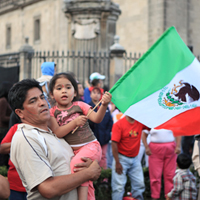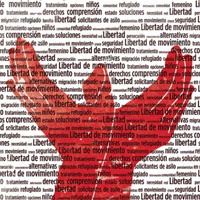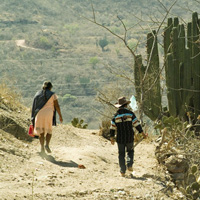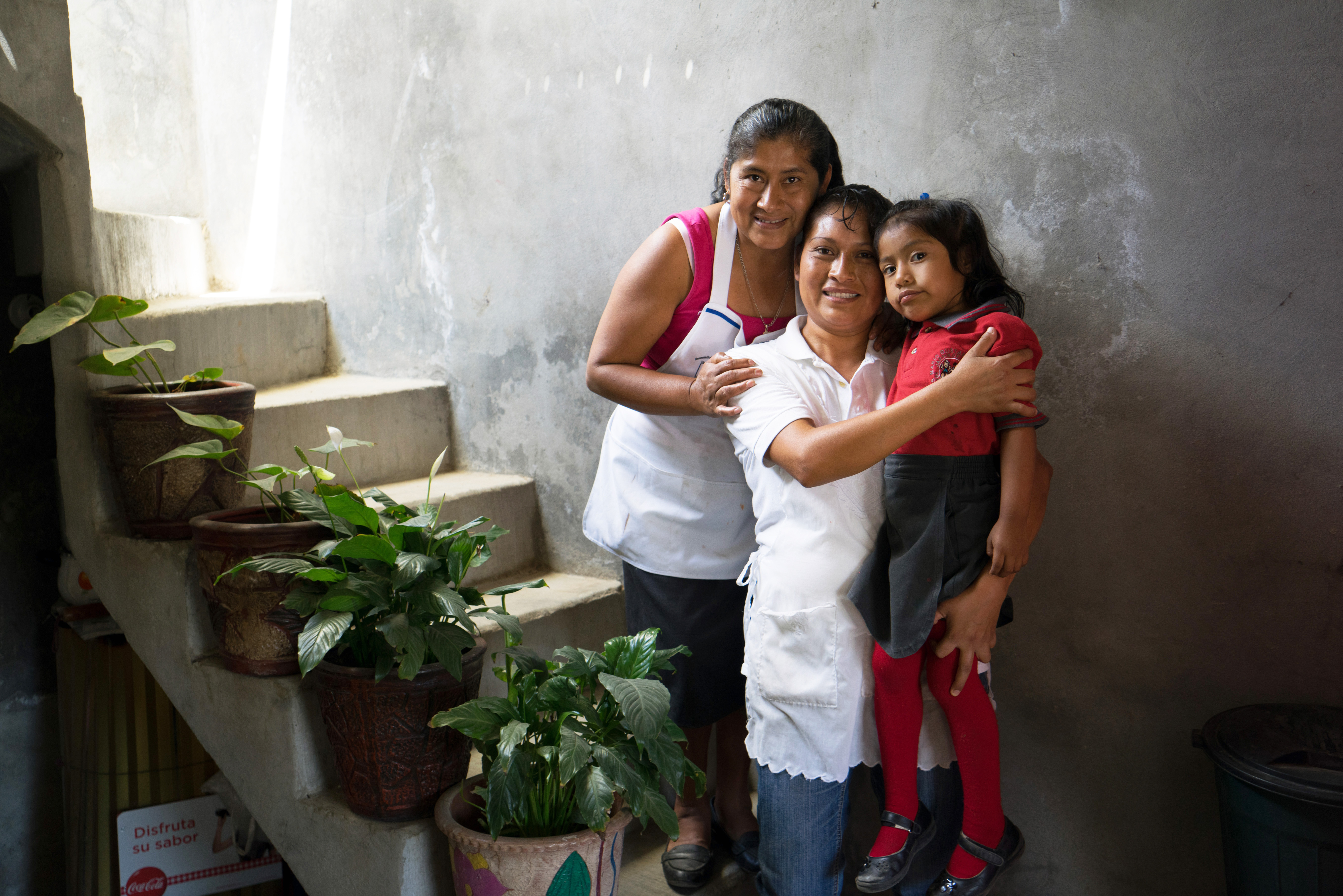
Summary
From 1984 to 2020, we made 1,237 grants totaling over $230 million.
From 1984-2020, MacArthur awarded more than 1,200 grants totaling over $230 million to organizations and individuals in Mexico. The Foundation opened our first office in Cuernavaca in 1992 and moved to Mexico City in 1996. Grantmaking focused on advancing reproductive and sexual health and rights, strengthening human rights, and addressing regional migration issues. We built longstanding relationships with thousands of individuals whose commitment to social justice is helping to build a vibrant society that values freedom of expression, human rights, democracy, diversity, and equity.
Investments in People: The Fund for Leadership Development
Our first program in Mexico was the Fund for Leadership Development (FLD), which operated in Brazil, India, Mexico, and Nigeria. In Mexico, the FLD ran between 1992 and 2001 and supported leaders in reproductive health issues and the intersection of reproductive health, human rights, and environmental conservation. The FLD supported mid-career individuals and established a network of leaders that remained important to the Foundation over the years.
An independent locally-based committee of civil society, academic, and government representatives selected the grant recipients. We provided networking opportunities, which enabled the group of FLD leaders to create new networks. Several FLD recipients established new organizations that built a civil society infrastructure. Another benefit of this program was that it introduced MacArthur to Mexican civil society with flexible support, laying the groundwork for subsequent programs. We supported leaders in human rights, Indigenous rights, and women’s rights and established a strong network in Mexican civil society. Many organizations run by FLD leaders and partners went on to become grantees in other programs. In 2001, the program was transferred to Fondo Semillas, the only feminist fund in Mexico, and continued work until 2013. In 2017, we commissioned an evaluation of the FLD initiative.
In addition to the individual grants provided through the FLD program, we provided support for academic research through our Research and Writing program, and a special scholarship fund in collaboration with other U.S. private donors that sponsored post-graduate research in the social sciences.
91 individuals received FLD support directly from MacArthur, totaling over $5,414,000 from 1991-2001. An additional 88 received support from Fondo Semillas between 2002-2013.
Conservation and Sustainable Development (1985-2003)
In Mexico, the conservation-related programs provided $11,514,000 in 75 grants from 1985-2003.
Alongside the early work to on the FLD, we invested in biodiversity through the Conservation and Sustainable Development program and other conservation-related programs, helping build a strong cohort of environmental organizations. Mexico’s proximity to the United States, a growing interest from government and organizations in environmental protection, global recognition of Mexico’s unique biodiversity, and the convergence of conservation and population issues made Mexico an important country for the Foundation to support this work. Managed from our office in Chicago, we supported emerging organizations to advance policy and advocate for the protection of Mexico’s biodiversity and university programs that advanced the study of the environment.
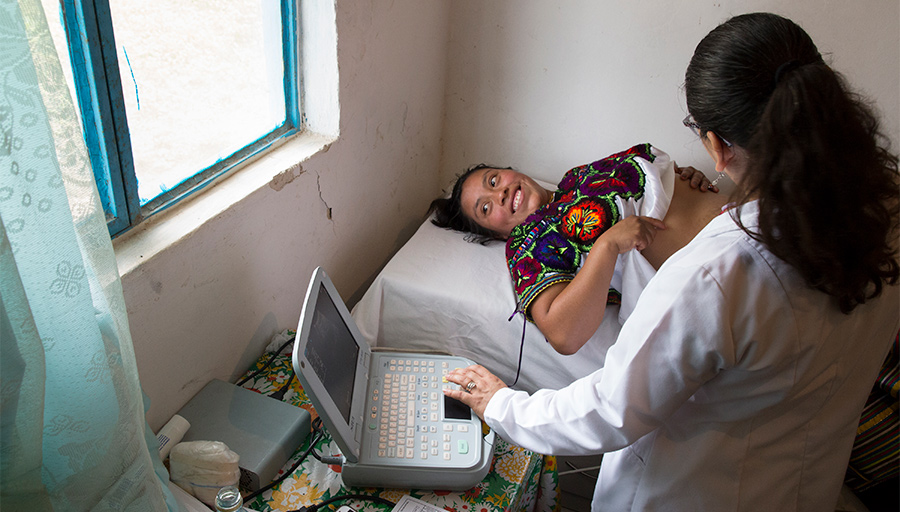
Doctor Virginia Mena conducts ultrasounds for women in a remote village near Ocosingo, Chiapas where a maternal death had recently occurred.
Photo by Janet Jarman
Population and Reproductive Health (1986-2019)
The PRH program provided $102,621,405 in 535 grants from 1984-2019.
MacArthur’s Population and Reproductive Health (PRH) program provided support for research, policy, and programmatic interventions in a field that was emerging at the time. In the 1990s, MacArthur helped strengthen and vitalize a global movement around the 1994 International Conference on Population and Development and the 1995 Fourth World Conference on Women. Mexican organizations gained momentum from the conferences and the growing women’s health movements put women’s rights at the forefront. To bolster the movement in Mexico, we supported emerging women’s rights groups and national networks and contributed to the paradigm shift from population control to reproductive health and rights. The Foundation’s early investments catalyzed a dynamic feminist movement in Mexico that remains strong.
In the early 2000s, the PRH program built on this broad momentum and focused grantmaking on two areas—maternal mortality and young people’s sexual and reproductive health. Grantmaking in Mexico advanced women’s rights to decide if, when, how, and with whom to have children, and promoted universal access to free, quality reproductive and sexual healthcare. As organizations worked to advance birth justice—the idea that all women have the right to access good pregnancy and childbirth care—they also advanced abortion rights. Mexico City decriminalized abortion in 2007, and Oaxaca followed twelve years later in 2019. MacArthur’s support of national networks of young people who advocated for their right to contraception, sexuality education, and participation in policy design contributed to federal and state policies that provide sexual and reproductive health services. Indigenous youth in Chiapas, Guerrero, and Oaxaca developed local models for their communities and schools.
The Mexico office’s final grants in reproductive health centered on midwifery as a way to improve the quality of reproductive healthcare. This strategy was co-designed with grantees and ran from 2015-2019. Advocacy, mobilization, and research helped establish greater recognition of midwifery as an essential, yet still missing component of the country’s maternal healthcare.
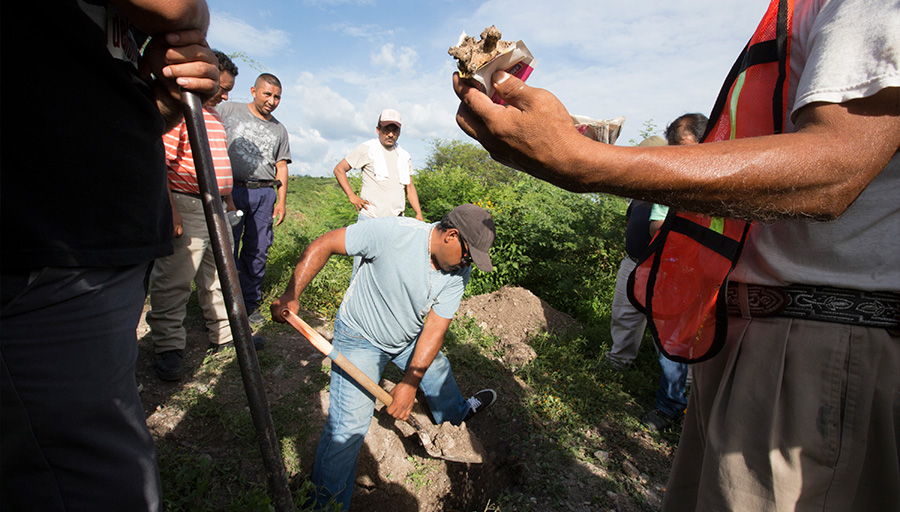
A volunteer citizen police member holds up a bone fragment found during a dig for human remains on the outskirts of Iguala, Mexico.
Photo by Janet Jarman
Human Rights (2000-2020)
The Human Rights program provided $49,523,731 in 210 grants from 2000-2020.
In 2000, for the first time in more than 70 years, Mexicans voted in a president from an opposition party, creating greater opportunities for democracy in the country. For MacArthur, this presented an opening to expand our Human Rights program to Mexico. The Foundation supported human rights efforts including the drafting of the first National Human Rights Plan in 2001; documentation of human rights violations; police reform; strategic litigation by human rights lawyers; academic research; and efforts to bridge divides between academia, civil society organizations, and government. Similar to the Population and Reproductive Health program, Mexico Human Rights grantmaking evolved from supporting broad efforts in its early years to exercising greater focus as the program matured. In the early 2000s, we supported efforts to bring transparency and accountability to Mexico’s ombuds system, to improve efficiencies in terms of case resolution, compliance with recommendations by state actors, and reparations to victims.
In 2008, when Mexico reformed its criminal justice system from a presumption of guilt to a presumption of innocence, we reoriented our resources toward strengthening this system, which held great promise for more expedient, transparent, and just trials. Our focus on criminal justice and investigations was further refined in 2014 on the heels of the disappearance of 43 students from Ayotzinapa, Guerrero, and the mismanagement of the investigation. After 2006, violence spurred by government efforts to quash drug-related crime were spiraling out of control: over 70,000 people were forcibly disappeared between 2006 and 2020. We supported organizations around the country working to improve efficiency, transparency, and professionalism by state investigators and to support victims of human rights violations. Psychosocial and legal support provided by civil society organizations buoyed entire families in complicated and lengthy legal and administrative processes. The 2017 Law on Disappearances, created with the input of civil society organizations and families, offered some respite. Efforts to safeguard the promise of truth and justice for victims and their families continue.
From 2017 to 2019, the process of redesigning the country’s federal and state Attorneys General’s offices became a central concern of civil society organizations working for rule of law and human rights. In conjunction with a coalition of human rights organizations, we designed a short-term grantmaking strategy to support efforts that underscored the urgent need for autonomy in federal investigations. The #FiscalíaQueSirva movement gathered human rights defenders, lawyers, and the business sector in high-profile activities that demanded a merit-based, transparent designation of the New National Prosecutor with autonomy from the President. The collective efforts in Mexico earned respect from criminal justice experts around the world, but organizations continue to push for transparency, autonomy, and accountability.
Two videos illustrate how civil society organizations working on human rights issues in Mexico have pursued a variety of strategies to fight impunity.
The Regional Migration Corridor Initiative (2012-2015)
MacArthur provided $7,900,000 in grants to 17 organizations in the Regional Migration Corridor from 2012-2015.
MacArthur’s grantmaking for Migration in Mexico was part of larger, global efforts. Because migration is central to so many aspects of life in Mexico, our support for migration issues in Mexico dates to the 1990s, with grants for research, work on refugee rights, and documentaries. Before officially launching our Regional Migration Corridor Initiative, from 2006-2011, the Foundation’s Global Migration and Development program made 13 grants totaling $3,200,000 for Mexico-based organizations working on migration and protection of migrants’ rights to improve the governance of international migration and foster a better understanding of the relationship between migration and economic development. That initiative helped build an international framework for migration cooperation, supported innovative research on migration governance and development issues, and funded interventions to improve the lives of migrants.
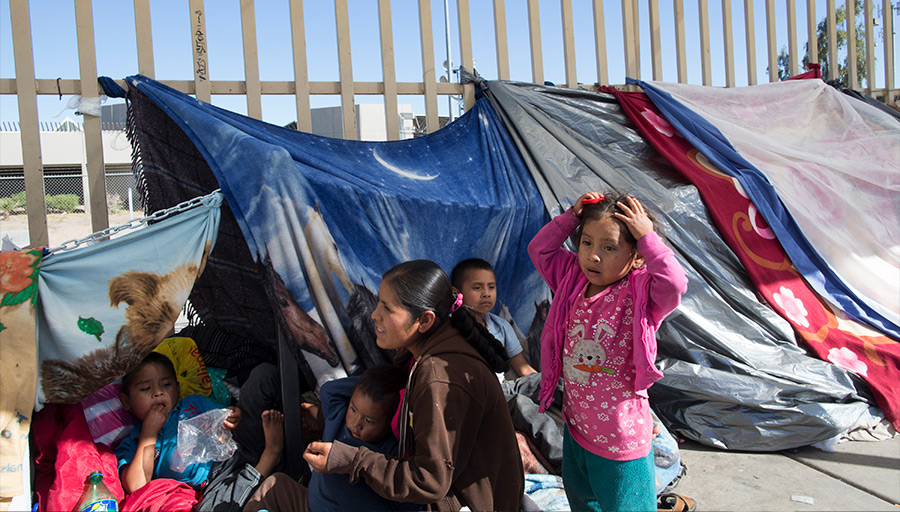
Ofelia Barrera, tries to manage and feed her four children outside the makeshift tent where they are currently living along the border fence at at San Luis Rio Colorado, Mexico and Yuma Arizona.
Summary
As the program grew, it became clear that these global policies needed to be grounded into practical programs that could improve the lives of migrants. The Mexico and Chicago offices designed a regional strategy that would embrace migration issues in the United States, Mexico, and Central America. In 2012, the Foundation launched the Cross-Foundation Migration Program in North and Central America. The U.S. segment of the program focused on U.S. immigration policy while the Mexico office supported Mexico-based organizations working on behalf of migrants from Mexico, Honduras, Guatemala, and El Salvador.
MacArthur-supported civil society organizations advanced important policy in Mexico that opened new avenues for better protection for migrants’ basic rights. The increasing return and deportations of Mexican nationals from the U.S. at the time also resulted in ramped-up enforcement that posed significant challenges for Mexican institutions grappling with how to best receive and integrate an unprecedented number of returning migrants, especially children. In 2013, informed by MacArthur-supported Mexican migrant advocates, Mexico’s Supreme Court issued the first set of guidelines for judges in administering and evaluating cases in which migrants and seekers of refugee status are involved. In a similar vein, a concerted effort by MacArthur grantees across Mexico and Central America resulted in an important milestone in the pursuit of justice for Central American migrants transiting through Mexico: a long-awaited Transnational Mechanism for Reporting Crimes Against Migrants. Beginning in December 2015, families of Central American migrants could submit a request for investigation in a potential case of abduction or death of their loved ones with the Mexican authorities in the nearest Embassy. These legal structures help migrants and advocates obtain justice as they navigate the complex migration systems, and civil society organizations were, and continue to be, at the forefront of advocacy and organizing efforts on behalf of migrants in the region.
Our Work’s Legacy
For over thirty years, we supported the growth of civil society through programs that addressed specific, separate issues and together upheld social justice. MacArthur grantees contributed to lasting reforms and societal changes across their areas of work.
Our final contribution was a $10 million, five-year grant in 2019 to establish and operate a new organization focused on social justice issues that would advance human rights locally. In August 2020, Acento: Acción Local was publicly launched and made its first call for proposals, focused on organizations that face obstacles to accessing resources. Acento will provide financial and technical support to grassroots movements and groups in Mexico, continuing work to strengthen and build up civil society’s ability to advocate for human rights and social justice.
Program Evaluations
Evaluation of the MacArthur Foundation’s Mexico Midwifery Initiative 2015-2018
Evaluation of the Fund for Leadership Development Initiative
Baseline Report on MacArthurs Initiative to Promote Midwifery in Mexico
Evaluation of The MacArthur Foundations Work in Mexico to Reduce Maternal Mortality 2002-2008
Human Rights Grantmaking Highlights
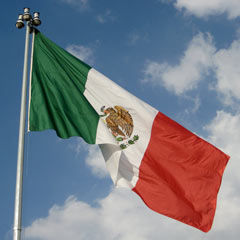
Holding the Prosecutor’s Office Accountable
September 14, 2020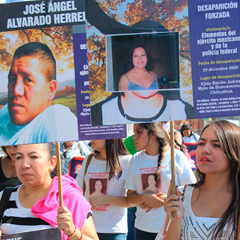
Litigating Human Rights
March 5, 2020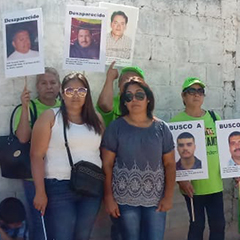
Preserving Evidence of Disappearances
August 27, 2020Population and Reproductive Health Grantmaking Highlights
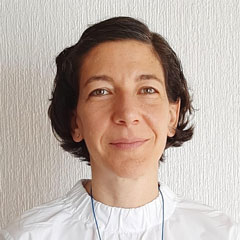
Government Partnering with Civil Society to Improve Reproductive Health in Mexico
November 4, 2020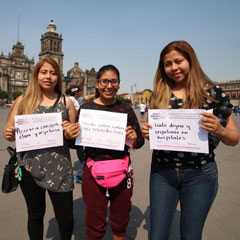
Mexican Women on What They Need for Reproductive Health
November 24, 2020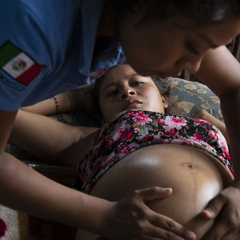
Progress and Prospects: Bringing Midwives Back to Mexico
November 12, 2019Additional Resources
Staff
- Kate Abramson, Team Administrator
-
Carmen Barroso, Director, Population and Reproductive Health
-
Beth Basta, Team Administrator
-
Sharon Bissell, Director, Mexico
-
Stuart Burden, Senior Program Officer
-
Alvaro Camacho, General Services, Mexico
-
Kimberly Collins, Associate to the Managing Director
-
Maria Elena Casillas, Office Administrator
-
Elizabeth Gonzalez, Business Systems Analyst
-
Quinn Hanzel, Grants Manager
-
Helen Harrison, Associate to the Managing Director
-
Judith Helzner, Director, Population and Reproductive Health
-
Phillis Hill, Senior Grants Manager
-
Ana Luisa Liguori, Director, Mexico Office
-
Liliane Loya, Deputy Director, Mexico
-
Liliana Monroy Flores, Office Administrator, Mexico
-
Jennifer Martinez-Roth, Communications Officer
-
Mary Page, Director, Human Rights
-
Stephanie Platz, Managing Director, Programs
-
Amy Shannon, Program Officer
-
Erin Sines, Director, Population and Reproductive Health
-
Gabriela Suarez, Senior Grants Manager
-
Mitch Wallerstein, Vice President
-
Ursula Wheeler, Team Coordinator
-
Woody Wickham, Vice President



